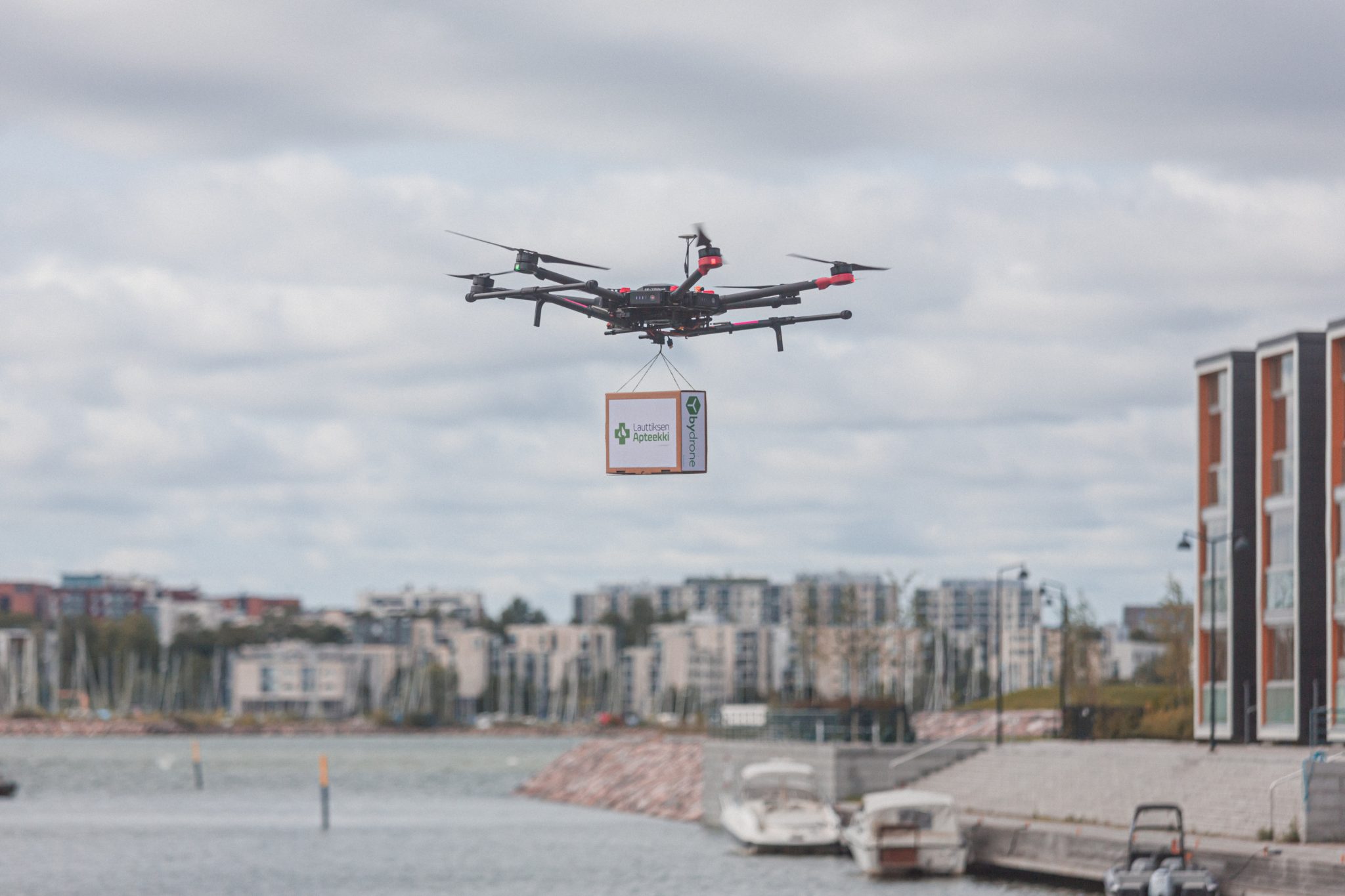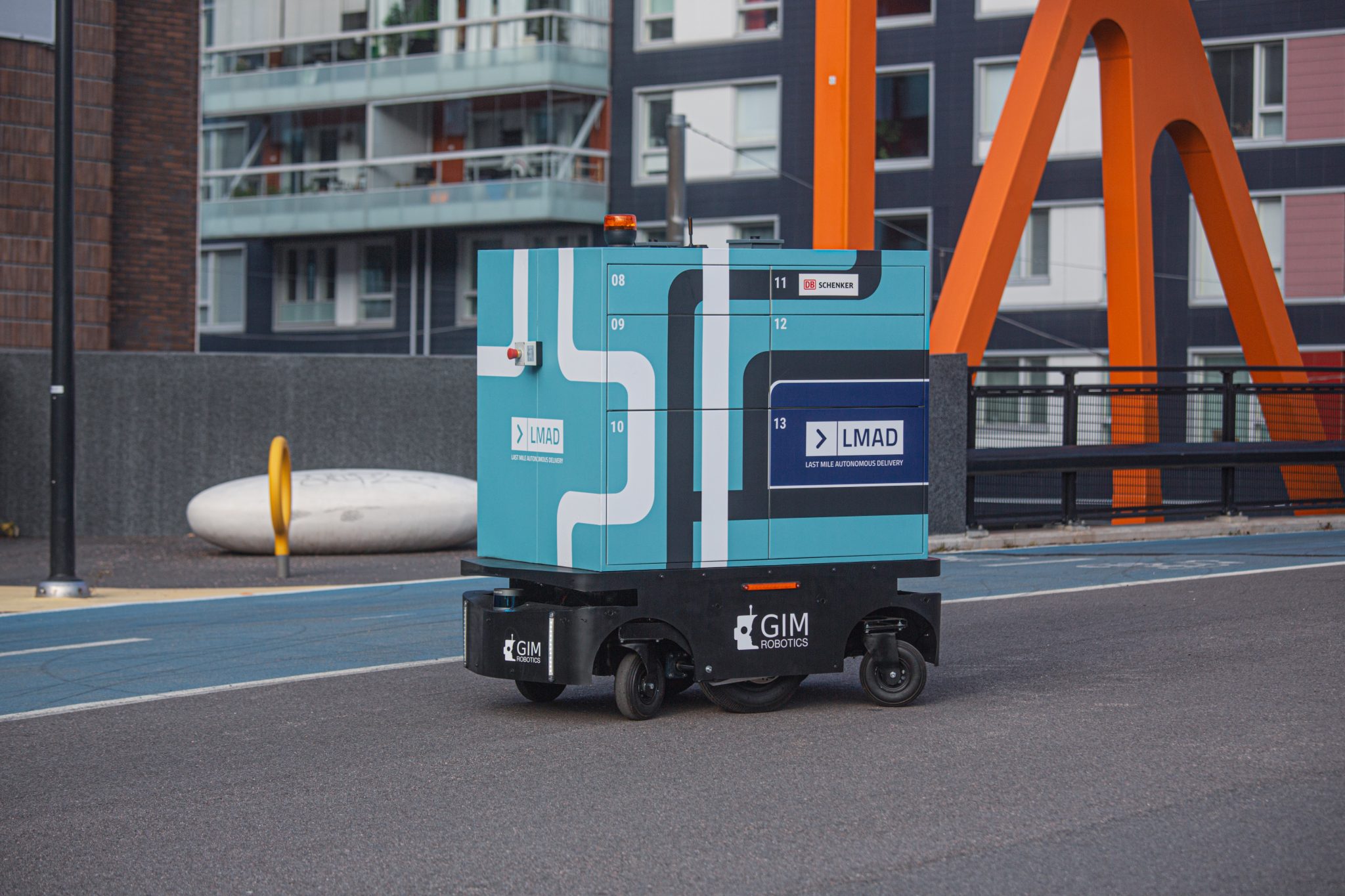Various delivery pilot projects in Jätkäsaari, Helsinki, in the autumn
In autumn 2021, Helsinki saw various pilot projects both on the ground and in the air. The newest kind of pilot was the delivery of products from a pharmacy to a customer by drone, which took place in late August. In the week-long pilot, products from the Lauttiksen Apteekki pharmacy in the Lauttasaari district were flown on a drone to the Jätkäsaari district.

The purpose of the pilot was to collect experiences on the drones’ suitability for delivering pharmacy products and to test a new service concept together with real customers. The electric drones have potential for lowering the emissions of the logistics industry. Their other benefits include their speed and the opportunity to make deliveries to places which have only a few local services or which are difficult to access (such as islands).
The pharmacy products ordered by the customer were packed into a temperature-controlled package, which was flown by a drone from Lauttasaari to Saukontori Square in Jätkäsaari, two kilometres away. The customers then picked up their order from the drone’s landing point in the square. No medications were carried during the pilot.
Lauttiksen Apteekki, the pharmacy that tested drone deliveries from Lauttasaari to Jätkäsaari, sees new opportunities in this delivery method. It allows customers to be reached quickly without them having to visit the pharmacy in person.
“Pharmacies’ tasks are becoming increasingly diverse. Preparing for future requirements and staying at the head of development requires innovations, product development and the desire to try new technologies. In the future, drones in the sky may be a fast way of delivering orders from the pharmacy’s webshop directly to customers or urgent orders to nursing homes, for example. In addition to speed, a drone’s significantly lower emissions, compared to road transport, is also a significant aspect,” says pharmacist Risto Holma from Lauttiksen Apteekki.
Safety first
A dense urban environment, like the inner city of Helsinki, poses challenges for drone deliveries. The company in charge of operating the deliveries, Third Space Automation Oy, has paid special attention to flight safety.
“We adhere to the strictest safety regulations, and our team is very experienced. We are using a commercial drone equipped with the highest-level safety systems,” says Arshia Gratiot, CEO of Third Space Automation.
For Third Space Automation, the delivery pilot for pharmacy products was a chance to test its own service. The goal is to be able to make deliveries even to destinations that are difficult to reach.
“We designed the ByDrone delivery system used in the pilot into a special service for health products. In the future, we’ll aim to deliver medications, blood and vaccines, among other things, to places that are otherwise difficult to access for deliveries,” Gratiot says.
For its part, the UIA HOPE project expands the selection of zero-emission vehicles that promote sustainable mobility in Helsinki. Earlier, the residents of Helsinki voted for electrically-assisted city cargo bicycles in the My Air Quality poll. The pilot for these bikes started in Jätkäsaari and its surrounding areas in July and will continue until October.
Residents are able to test cargo bikes free of charge for 30 minutes, after which they are charged a fee for the bikes. The operating area of the bikes has not been restricted, but users must return them to either Jätkäsaari or Ruoholahti. Users can find and start using cargo bikes via a smartphone app downloaded from the Google or Apple app store.
The utilisation rate of Colossus Oy’s shared cargo bikes has been high, and the number of new users has been even greater than expected. Residents have clearly discovered the service and have recognised its benefits as a part of their neighbourhood’s transport system.
Read more about the cargo bike service at: https://citycargobikes.com/

In addition to drone and cargo bike pilots, there will also be other pilot projects related to logistics in the Jätkäsaari district of Helsinki. The French-Finnish company LMAD will execute together with DB Schenker and GIM Robotics a pilot for an autonomous delivery robot in Jätkäsaari. The pilot will improve the service level for end customers by expanding the pick-up network and delivery capacity of DB Schenker. At the same time, the aim is also to improve delivery speeds and cost levels. During the pilot, multiple virtual pick-up points will be created, at which the delivery robot will stop for 30 minutes. Currently, only one pick-up point is providing pick-up services for 15,000 people in the Jätkäsaari area, which means that LMAD’s service will answer to a real need of the end users’.
The drone pilot is a part of the Jätkäsaari Mobility Lab project run by the City of Helsinki and its innovation company, Forum Virium Helsinki, in which companies test new services and technologies in an authentic urban environment. The project also includes studying how drones can be used for healthcare needs. From the pilot, the City of Helsinki will receive information about how city planning can prepare for the growth in drone operations, and what kind of a role cities of the future play as an operating environment for unmanned and manned aircrafts.
The parties responsible for the cargo bike pilot are Colosus Finland Oy / Nezeco, and it is funded by the HOPE project and other partners of Colossus Finland. As for the UIA HOPE project, the pilot is related to the Testbed Helsinki operations of Helsinki’s Economic Development Division.
Helsinki also has other ongoing operations to improve logistics through accessibility data, for example: https://forumvirium.fi/en/logistics-accessibility-data-better-transport-services-with-data/
